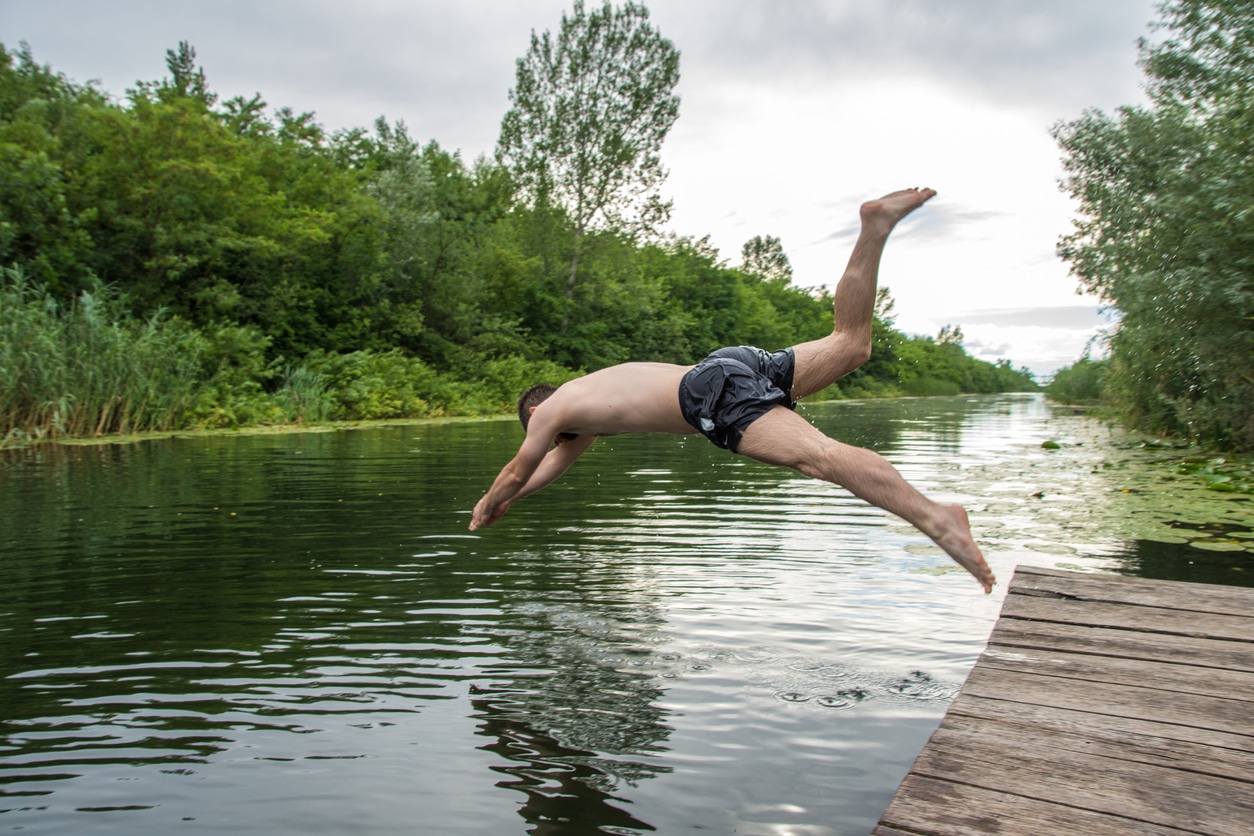
Wild Swimming: How Spending Time In Nature Boosts Your Mental Health
From battling stress and the symptoms of burnout to mental health conditions, it’s long been believed by outdoor enthusiasts nature offers something of a cure for our overall well being. Nature therapy, or ecotherapy, is the practice of spending time outdoors to encourage healing and calm, which can have a positive effect on our mental health.
In particular, wild swimming is growing in popularity as a way to combine exercise with ecotherapy. Here, we take a look at what wild swimming can do for your health and mindset, as well as why spending time outdoors is so good for us.
What is Wild Swimming?
While there are various forms of nature therapy you can take part in, from hiking and running to hopping on your bike and exploring the local countryside, it’s wild swimming which is the go-to option of late. Sometimes referred to as “open water swimming”, wild swimming is the act of swimming in natural bodies of water, from lakes and streams to the sea and even natural pools in your own backyard.
As one pool expert explains, “if you love that feeling of diving into a lake, river or pond, allowing the natural water to swirl around you, natural pools are designed to offer a similar experience. Over time, the plants and wildlife that come to the pool help to create a beautiful spectacle, allowing you to bathe peacefully amongst nature whenever you like”.
There’s been a resurgence in recent years for this activity and more people are exploring their local areas for places to take a dip and enjoy the wonders of the water. It’s an invigorating activity that can be incredibly sociable and relaxing. It can also can be beneficial for your mental health.
What are the Benefits of Wild Swimming?
Wild swimming, and nature therapy in general, offers so many health benefits, but it’s particularly regarded for its positive impact on one’s mental health. Nature’s healing powers can be beneficial for people with anxiety and depression, ADHD and PTSD, as well as a myriad of physical conditions such as injury recovery.
Swimming is a gentle form of exercise soothing to the body and mind. Wild swimming has the added benefit of being able to enjoy swimming surrounded by fresh air, blue skies and foliage. It only serves to further enhance the relaxing properties. We’ve all experienced the calm we feel listening to the sound of rustling leaves or crashing waves, and immersing ourselves within that soundscape can be very relaxing for a busy mind struggling to switch off.
A meditative effect
Swimming in general is a repetitive and calming form of exercise, because you’re focusing on your technique and breathing. It brings you entirely into the present moment, which is great for helping to slow a racing mind and help you disconnect. The added benefits of natural surroundings, calming sounds and distinct lack of distractions from phones and TV, can make wild swimming an especially effective form of meditation.
Reduced inflammation
Inflammation is a symptom of so many of our health problems today, from stress and depression to a variety of other mental health problems. While inflammation isn’t an issue in the short term, over time it can actually make mental health symptoms worse. But research suggests wild swimming can provide an anti-inflammatory reaction which can be great news for those struggling with mental health issues.
Lowered cortisol
Excess cortisol in the body has been connected to a variety of health problems, from migraines and heart problems to even a lower life expectancy. Unfortunately, it’s very common in our fast-paced world, where we’re all racing from one task to the next with little time to relax. But the cold temperatures you’re exposed to when you take part in wild swimming can actually reduce stress in the body which, in turn, has an antidepressant effect on the mind. Those who take part in outdoor swimming report lower stress and anxiety as a result of the chilling temperatures.
Increases serotonin
In addition to minimizing stress, wild swimming and spending more time in nature can actively increase levels of happy hormones in the body. Studies have shown cold water immersion can increase dopamine levels by as much as 250% and boost feel-good chemicals in the brain. When you take a dip in open waters, you feel invigorated and alive, and that feeling lasts long after you’ve dried off and gone back to your regular routine.
Enhanced neuroplasticity
Neuroplasticity is the term for when the brain experiences something new and new connections and pathways are formed in the brain. Trying out something that pushes you out of your comfort zone quite literally alters your brain’s make-up and causes it to function in different ways for the better. There’s also a confidence boost you get from getting outside and feeling the thrill of adventure. You feel more able to take on new challenges and this can be incredible for your mental health and self-esteem. There are even suggestions from experts in the field that nature restores our cognitive resources, so we are able to concentrate and pay attention more effectively.
Minimizes SAD symptoms
Seasonal Affective Disorder (SAD) is a form of depression which affects people during particular seasons, but being in natural light has been shown to help. Getting outside and among nature can reduce the symptoms that go along with SAD, such as low mood and stress, and help those struggling feel more connected to their surroundings and the seasons. For some, SAD comes with feeling a loss of interest in everyday activities, but trying something new and spending time outdoors can combat this.
Keeping Safe in Open Waters
Open water swimming offers many benefits, as we’ve explored, but it’s still important to consider your safety when you’re outside. For example, swimming with a friend or a local wild swimming group, especially if you’re new to it, can help you gain confidence and give you the support of others should anything go wrong.
Make sure you stay close to exit points so you can get out easily when you’re more tired, and don’t stay in the water too long when you’re first adjusting to the colder temperatures — two minutes is typically enough in the beginning. Lastly, remember to wrap up warm when you get out or drink a hot drink to help your body return to a normal temperature. As with any new exercise, starting off slow and building up as your body adapts is the best way to enjoy the benefits without causing harm to your body.
As humans, we rely on nature to survive and interacting with it directly can help enhance our health and wellbeing. We spend so much time in front of screens and exposed to artificial stimuli, getting back to nature can do wonders for our mental health, and wild swimming is a great way to combine that with a soothing and rewarding exercise. Whether you choose to swim in a nearby lake, head to the ocean or take a dip in your own backyard, it’s the perfect way to spend more time in nature and do something positive for your mental health.



Post a comment